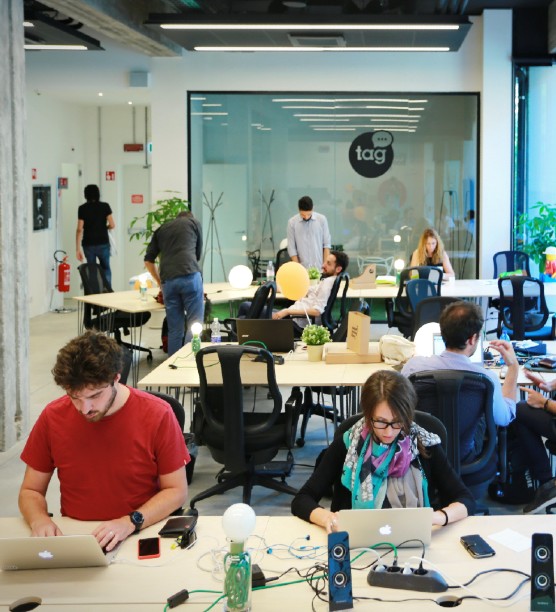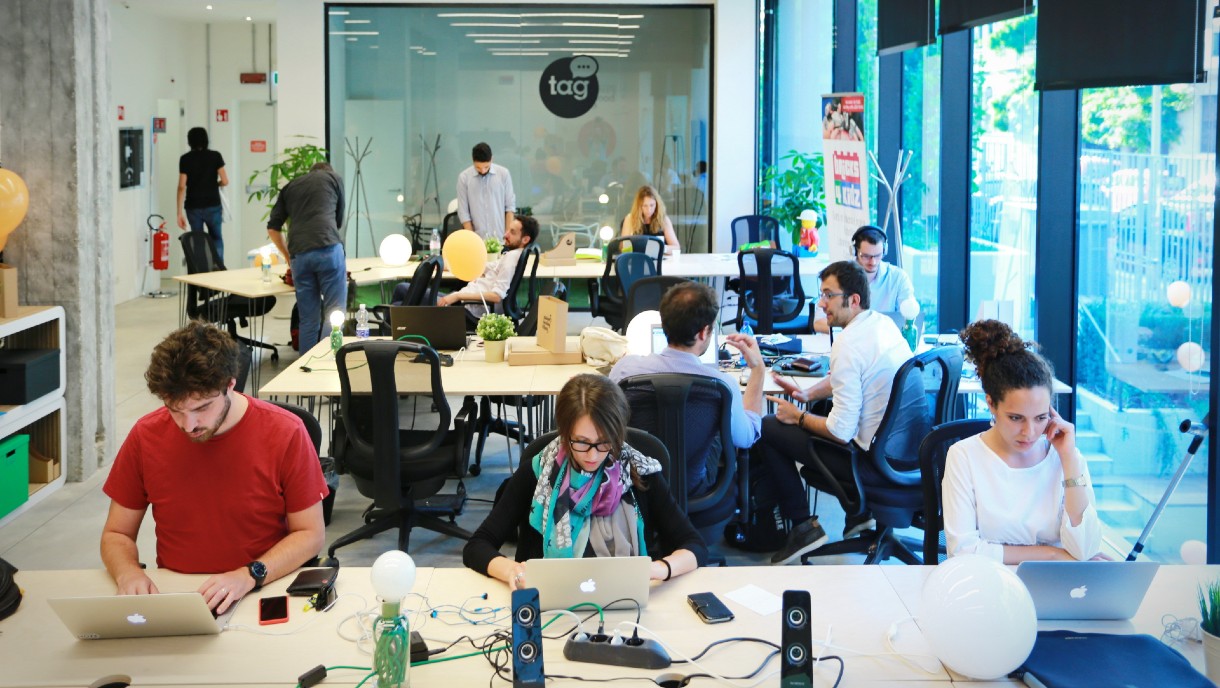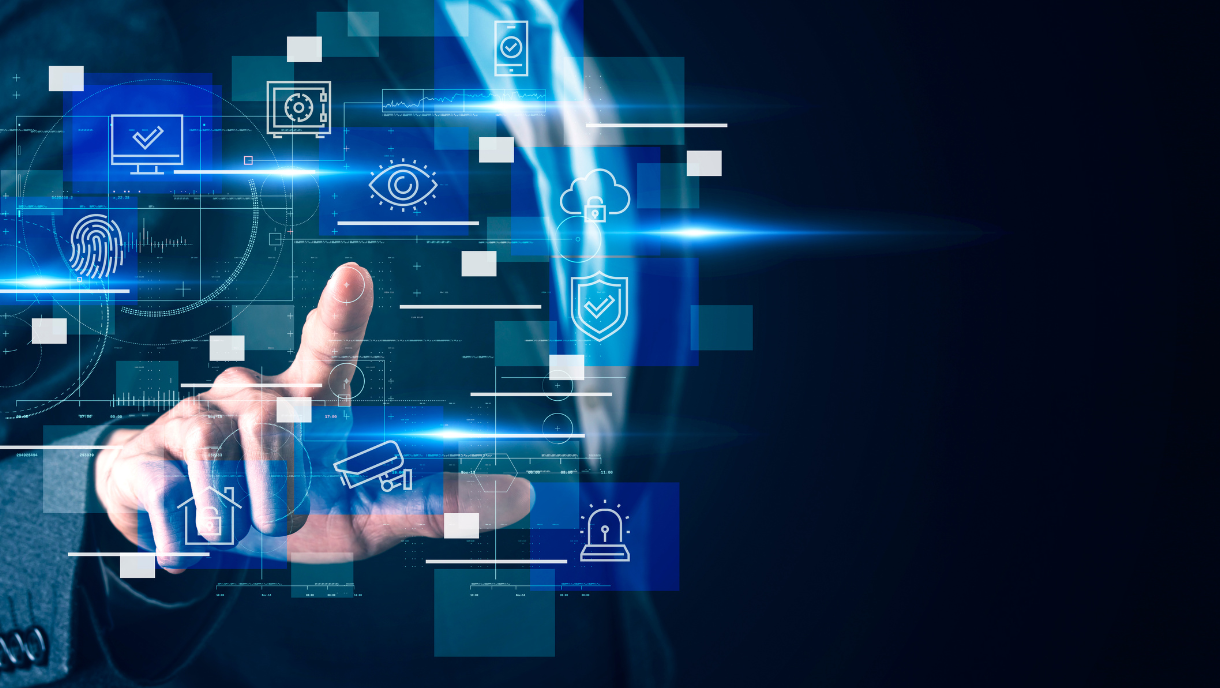The concept of physical office space is changing rapidly. The global pandemic resulted in severe lockdowns worldwide, forcing organizations to employ containment measures. As businesses return to traditional workplaces, there is growing interest in the cost-effective option of sharing workspaces called co-working spaces. Commercial real estate has picked up on this trend, and according to The Business Research Company, the co-working space market is expected to have a CAGR of 18.9% by 2026
The rise of coworking
Many businesses are reconsidering their office work culture, and the convenience of co-working spaces is attractive. The rental fee for co-working spaces typically includes office space, furniture, wireless internet connection, hardware, software, and other amenities.
The growing number of startups is the primary catalyst for the rise of co-working spaces as they present an economically feasible model of shared workspaces that are eco-friendly and sustainable, and landlords are interested in converting their properties into commercial co-working spaces. Industry-specific co-working spaces encourage different organizations in the same field to be productive and collaborative.
Access control challenges in coworking spaces
Multiple organizations sharing a co-working space may have different security policies. The people who share the co-working space will never remain constant, especially when property owners offer daily rental services for office workspaces. Other working professionals will visit the workspace; not all require permanent access. Given the dynamic nature of co-working spaces, storing the details of workers who use the shared offices takes work. All these considerations give rise to the security risks described below.
Security Risks at Co-Working Space
Internet and Data Security
Organizations in a shared workspace share the amenities, including internet access. Data breaches and malware attacks threaten the security of co-working spaces. The property manager must deploy controlled access to the networking resources. Some entrepreneurs may rent the space longer, while freelancers may use a daily pass. Therefore, a small access control loophole is all a hacker needs for a data breach.
Privacy risk
Unlike traditional office spaces, coworking spaces are shared by multiple organizations. Some companies may rent a space close to their competitors for potential data theft. Coworking spaces must have multiple levels of security and access control to ensure that only authorized personnel enters critical areas.
Physical security
All the gates, doors, and pathways must be armed with physical access control systems (PACS). Mobile access control is becoming the new standard for co-working spaces, allowing authorized individuals to use their smartphone credentials to gain access. Touchless access control is increasingly gaining importance. Multiple access control methods have to be employed to ensure physical security.
Lockable and protected space
Ensuring the physical safety of equipment and data within co-working spaces is critical. Organizations renting long-term co-working spaces expect lockable, private storage for their equipment and data. Access to these protected areas or vaults must be restricted to only authorized people. Commercial property owners must employ strong security policies and strategies to mitigate safety and security risks. (Also Read – Maximizing security in commercial buildings)
Physical security in coworking spaces
AI and cloud-based access control provide a safer workspace for multiple organizations sharing facilities and working together. The quick tracking feature of intelligent access control enables easy tracking of people entering and leaving the facility. One of the best features of any intelligent access control system is the ability to provide conditional and time-bound access.
It is also good to have a wireless access control system that is flexible and scalable. A centralized access control system allows granting or revoking access to specific doors, providing conference room access to a small group of people, switching workspaces to a different floor, and more.
Using a mobile access control system is another way to provide a secure and seamless access experience. Organizations using co-working spaces are mostly tech-savvy, and their employees do not have any problem using their smartphones to authenticate themselves to gain access.
Below are some of the ways to ensure physical security in a coworking space:
Cardless and Contactless Access Control
Users accessing the space can use their smartphones and other smart devices to gain access without carrying a physical card. Depending on the terms under which the space is rented, unrestricted or restricted access can be provided for a specific period.
Monetized And Rule-Based Access Control
Property owners can set up their access control system to generate revenue based on usage. Meeting and conference rooms can be provided as needed for a fixed price, with 24/7 access as an add-on feature. The property owner has complete control to revoke access permissions for non-paying renters.
Temporary Access Control
Visitors can temporarily access a co-working space for meetings and other official work. Unlocks can be scheduled for conferences that are already paid for. Rapid access is one of the key benefits of modern access control solutions.
Seamless Membership Tiers
You can customize the access control system and provide access permissions based on the membership plan and agreed level of clearance. Different workspace areas (e.g., hot desks, private offices, conference rooms) on any floor can be managed through a single solution.
Quick Onboarding
New members with access privileges can be onboarded quickly after gathering basic details. They can then download the innovative access application to their mobile devices to gain access to the workspace.
Tracking
Access events can be tracked and exported quickly for security audits and incident investigations. Emergency access enables locking or unlocking the entire building in emergencies.
While most access control systems installed at these co-working spaces cover these points, some may have only some of these features to ensure foolproof security. One can use retrofit access solutions to have all the security measures in place without replacing the existing PACS.
OLOID provides a retrofit mobile access control solution for hybrid workspaces and other commercial real estate buildings. It integrates seamlessly with the most popular RFID badge readers and existing PACS (without any rewiring or replacement to enable mobile access and other features).
FAQ
What security measures are in place to protect data and internet access in co-working spaces?
Co-working spaces deploy controlled access and network security protocols to safeguard against data breaches and cyber threats.
How is physical security ensured in a dynamic co-working environment?
Physical security is maintained through AI-based access control systems, mobile credentials, and multiple access methods.
Can organizations customize access levels for different areas within a co-working space?
Yes, access control systems allow for tailored permissions, granting different levels of clearance for various workspace areas.
What’s the benefit of using a mobile access control system in co-working spaces?
Mobile access systems offer secure and seamless entry for tech-savvy users, enhancing convenience and efficiency.
How can property owners generate revenue and control access in co-working spaces?
Access control systems can monetize space usage, allowing owners to offer add-on features and revoke access for non-paying renters.





